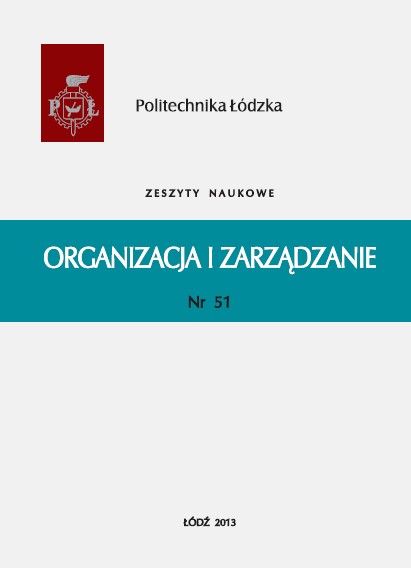Abstrakt
Celem opracowania jest identyfikacja zarysu dylematów współczesnego menedżera z zakresu zarządzania zasobami ludzkimi i zasygnalizowanie konsekwencji ich istnienia dla jego działań i decyzji. Tradycyjne zarządzanie zasobami ludzkimi dostarcza rozwiązań, które wydają się nieco naiwne, w stosunku do złożonego charakteru sytuacji współczesnych relacji organizacja-kierownik-pracownik. Autor tekstu podejmuje zatem próbę wskazania innych możliwości wspomagania pracy menedżerskiej na polu ZZL.
Bibliografia
Archer M.: Culture and agency: The place of culture in social theory. Cambridge University, Cambridge, 1988.
Bridges W.: The end of the job. Fortune, No. 19, 1994.
Haggerty J., Wright P.: Strong situations and firm performance: a proposed re-conceptualization of the role of the HR function’, [w:] A. Wilkinson, N. Bacon, T. Redman, S. Snell (eds.), The Sage Handbook of Human Resource Management, Sage, London, 2009.
Handy Ch.: Wiek paradoksu. Dom Wydawniczy ABC, Warszawa, 1994 (wydanie polskie 1996).
Hanzel C.M.: Temporary work in the public services. Implication for equal opportunities. Work & Organization. Vol. 10, No. 4, 2003.
Huws U.: Teleworking – limits and posibilities, IRS Employment Review, nr 613, 1996.
Janczak S.: “How Middle Managers Integrate Knowledge Within Projects”, Knowledge and Process Management, Vol. 11, No. 3, 2004.
Katz J.A., Welbourne T.M. (eds.): Managing people in entrepreneurial organizations: learning from the merger of entrepreneurship and Human Resource Management, Elsevier Science, Amsterdam 2002.
Koontz H.: The Management Theory Jungle revisited, The Academy of Management Review, No. 5, 1980.
Morgan G.: Paradigms, Metaphors, and Puzzle Solving in Organizational Theory. Administrative Science Quarterly, Vol. 25, No. 4, 1980.
Myers McGinty S.: Power Talk: Using Language to Build Authority and Influence Warner Business Book, Nowy Jork 2001.
Rubery J., Earnshaw J., Marchington M., Cooke F.L, Wincent S.: Changing organizational forms and the employment relationship. Journal of Management Studies. Vol. 39, No. 5, 2002.
Ryfkin J.: End of work: the decline of the global labor force and the dawn of the post-market era. Pulman, New York 1995.
Senge P.M.: Piąta dyscyplina, Dom Wydawniczy ABC, Warszawa 1990 (wydanie polskie 1998).
Torka N.: Atypical employment relationships and commitment: wishful thinking or HR challenge? Management Revue, Vol. 15, No. 3, 2004.
Weick K.E.: Making sense of the organization, Malden: Blackwell Business, Oxford 2001.
Werbach K.: Syndication: The emerging model for business in the internet era, [w:] N G. Carr (red.), The digital enterprise Harvard Business Press, London 2001.
Wiśniewski Z., Zawadzki K.: Przejściowe rynki pracy, jako nowa koncepcja Europejskiej Strategii Zatrudnienia. Polityka Społeczna. nr 4, 2005.
Zeffane R, Connell J.: Trust and HRM in The New Millennium. The International Journal of Human Resource Management, Vol. 14, No. 1, 2003.

